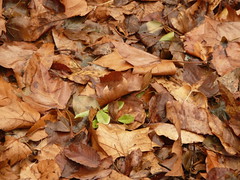Archive
precentor
pre·cen·tor /prɪˈsɛntər/
–noun
a person who leads a church choir or congregation in singing.Origin:
1605–15; < LL praecentor leader in music, equiv. to L praecen-, var. s. of praecinere to lead in singing ( prae– pre- + –cinere, comb. form of canere to sing; see canto) + –tor -tor—Related forms
pre·cen·to·ri·al /ˌprisɛnˈtɔriəl, -ˈtoʊr-/, adjective
pre·cen·tor·ship, noun
Source: Dictionary.com.
From the pulpit the precentor intoned the “Edent pauperes.”
Source: The Name of the Rose by Umberto Eco.
scapular
scap·u·lar 1 /ˈskæpyələr/
–adjective
of or pertaining to the shoulders or the scapula or scapulae.
Origin:
1680–90; < NL scapulāris. See scapula, -ar 1scap·u·lar 2 /ˈskæpyələr/
–noun
1. Ecclesiastical . a loose, sleeveless monastic garment, hanging from the shoulders.
2. two small pieces of woolen cloth, joined by strings passing over the shoulders, worn under the ordinary clothing as a badge of affiliation with a religious order, a token of devotion, etc.
3. Anatomy, Zoology . scapula.
4. Ornithology . one of the scapular feathers.Origin:
1475–85; < ML scapulāre, n. use of neut. of scapulāris (adj.). See scapular 1
Source: Dictionary.com.
The monks were now standing at the tables, motionless, their cowls lowered over their faces, their hands under their scapulars.
Source: The Name of the Rose by Umberto Eco.
lavabo
la·va·bo /ləˈveɪboʊ, -ˈvɑ-/
–noun, plural -boes.
1. Ecclesiastical.a. the ritual washing of the celebrant’s hands after the offertory in the Mass, accompanied in the Roman rite by the recitation of Psalm 26:6–12.
b. the passage recited.
c. the small towel or the basin used.2. (in many medieval monasteries) a large stone basin equipped with a number of small orifices through which water flowed, used for the performance of ablutions.
3. a washbowl with a spigot-equipped water tank above, both mounted on a wall: now often used for decoration or as a planter.
Origin:
1855–60; < L lavābō: I shall wash
Source: Dictionary.com.
The abbot was waiting for us next to a little fountain, with a white cloth to wipe our hands after the lavabo, following the ancient counsels of Saint Pachomius.
Source: The Name of the Rose by Umberto Eco.
enthymeme
en·thy·meme /ˈɛnθəˌmim/
–noun Logic.
a syllogism or other argument in which a premise or the conclusion is unexpressed.Origin:
1580–90; < L enthȳmēma < Gk enthȳ́mēma thought, argument, equiv. to enthȳmē-, var. s. of enthȳmeîsthai to ponder ( en– en-2 + –thȳmeîsthai v. deriv. of thȳmós spirit, thought) + –ma n. suffix of result—Related forms
en·thy·me·mat·ic /ˌɛnθəmiˈmætɪk/, adjective
Source: Dictionary.com.
“The Devil (God save us!) does not tempt a monk with serpents and two-headed men. If anything, with lascivious visions, as he tempted the fathers in the desert. And besides, if it is evil to handle certain books, why would the Devil distract a monk from committing evil?”
“That seems to me a good enthymeme,” my master admitted.
Source: The Name of the Rose by Umberto Eco.
licit
lic·it /ˈlɪsɪt/
–adjective
legal; lawful; legitimate; permissible.Origin:
1475–85; < L licitus permitted (ptp. of licēre ); r. earlier licite < MF; see -ite 2—Related forms
lic·it·ly, adverb
Source: Dictionary.com.
There is a magic that is the work of the Devil and which aims at man’s downfall through artifices of which it is not licit to speak.
Source: The Name of the Rose by Umberto Eco.
hypotyposis
hy·po·ty·po·sis /ˌhaɪpətaɪˈpoʊsɪs/
–noun Rhetoric.
lifelike description of a thing or scene.Origin:
1575–85; < Gk hypotýpōsis outline, copy pattern, equiv. to hypo– hypo- + týpōsis forming, molding ( týp ( os ) beat, impression, mold + –ōsis -osis)
Source: Dictionary.com.
The list could surely go on, and there is nothing more wonderful than a list, instrument of wondrous hypotyposis.
Source: The Name of the Rose by Umberto Eco.
quadragon
Doesn’t appear to be a ‘real’ word, but I found this:
What is trigonometry?
We can answer this by looking at the origin of the word trigonometry.
Words ending with -metry are to do with measuring (from the Greek word metron meaning “measurement”). (What do you think that thermometry measures? What about geometry? Can you think of any more words ending with -metry?)
Also, the -gon part comes from the Greek gonia) meaning angle. It is derived from the Greek word for “knee” which is gony.
The prefix tri- is to do with three as in tricycle (a three-wheeled cycle), trio (three people), trident (a three-pronged fork).
Similarly, quad means 4, pent 5 and hex six as in the following:
- a (five-sided and) five-angled shape is a penta-gon meaning literally five-angles and
- a six angled one is called a hexa-gon then we could call
- a four-angled shape a quadragon
(but we don’t – using the word quadrilateral instead which means “four-sided“) and- a three-angled shape would be a tria-gon
(but we call it a triangle instead)- “Trigon” was indeed the old English word for a triangle.
So trigonon means “three-angled” or, as we would now say in English, “tri-angular” and hence we have tri-gonia-metria meaning “the measurement of triangles”.
With thanks to proteus of softnet for this information.
Source: Two-dimensional Geometry and the Golden section.
And since there were forty windows (a number truly perfect, derived from from the decupling of the quadragon, as if the Ten Commandments had been multiplied by the four cardinal values), forty monks could work at the same time, though at that moment there were perhaps thirty.
Source: The Name of the Rose by Umberto Eco.
rubricate
ru·bri·cate /ˈrubrɪˌkeɪt/
–verb (used with object), -cat·ed, -cat·ing.
1. to mark or color with red.
2. to furnish with or regulate by rubrics.Origin:
1560–70; < LL rūbrīcātus (ptp. of rūbrīcāre to color red), equiv. to rūbrīc ( a ) red ocher ( see rubric) + –ātus -ate 1—Related forms
ru·bri·ca·tion, noun
ru·bri·ca·tor, noun
Source: Dictionary.com.
Antiquarians, librarians, rubricators, and scholars were seated, each at his own desk, and there was a desk under each of the windows.
Source: The Name of the Rose by Umberto Eco.
disiecta membra
Scattered limbs; fragments of a work
Source: Latin Phrases Dictionary.
I realized that he was not so much inventing his own sentences as using the disiecta membra of other sentences, heard some time in the past, according to the present situation and the things he wanted to say
Source: The Name of the Rose by Umberto Eco.
placitum
placitum (plas’i-tum), n.; pl. placita (-ta). [ML. see placit, plea.] In the Middle Ages, a public assembly of all degrees of men, where the sovereign presided, usually summoned to consult upon great affairs of state; hence, a resolution taken by such an assembly; also, a penalty or fine, or a plea or suit.
Source: The Century Dictionary Online.
Nor, for that matter, could I call Salvatore’s speech a language, because in every human language there are rules and every term signifies ad placitum a thing, according to a law that does not change
Source: The Name of the Rose by Umberto Eco.





Walking Commentary